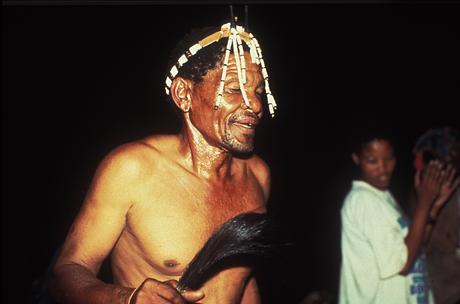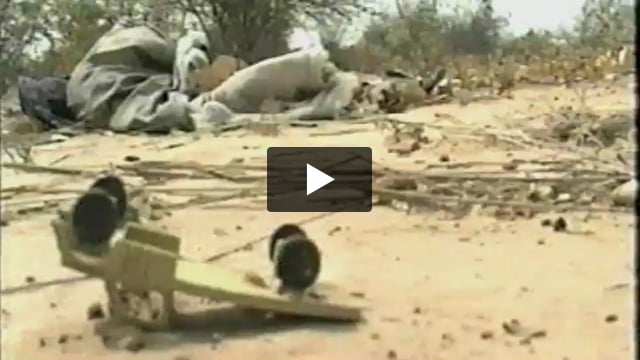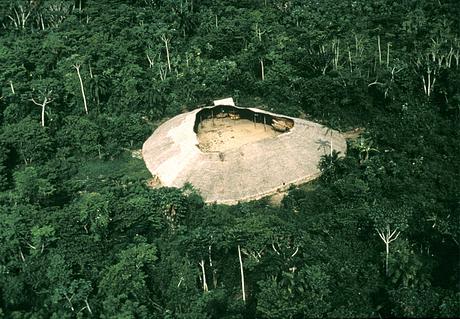Court in chaos - government lawyer 'arrested' - Bushman reserve sealed off
September 1, 2005
This page was last updated in 2005 and may contain language which is now outdated.
The Botswana government's lead attorney in the Bushman case was today ordered to be arrested and imprisoned. In some of the most extraordinary scenes ever witnessed in any high court, attorney Sidney Pilane, refusing to allow any policeman to touch him, fled arrest in a vehicle driven by another government witness, the Assistant Director of Parks. In a separate development, the government announced the closure of the Bushmen's reserve to visitors for ’administrative reasons'.
As special advisor to the President, Pilane may be hoping that his power surpasses that of the Botswana judiciary. He repeatedly refused to stand up when the judges were speaking to him. He was warned twice that unless he did so he would be cited for contempt. He still refused to stand up, leaving the court little alternative than to commit him to prison.
The court ordered he should be arrested immediately and brought back to court on Monday morning. This was the climax of Pilane's examination of the state's star ’expert witness', American ecologist and former employee of the Botswana government, Kathleen Alexander. Pilane was questioning her on material that the judges had already ruled should not be discussed. (A minute-by-minute account of this morning's events in court is appended below.)
Alexander had already made no secret of her contempt for tribal peoples and hunter-gatherers. She wants them all out of any protected areas in order to favour the animal inhabitants. Echoing remarks made by the president, she said that they had to evolve, claiming that 'culture' had nothing to do with ancestral land and they could practise it anywhere.
Amongst her asides was her comparison of inbreeding amongst animals 'to what happened to the ruling elite in England. The Queen's people would stay together and not mix.' Although she claims to want everyone out of all protected areas, she herself lectures to American tourists – inside game reserves – who each pay US$10,000, plus tips, for their trip.
Reacting to the fact that one of the Bushman's lawyers is British and that their case is funded by donations raised internationally, Pilane last week said, 'We do not want Europe to interfere and tell us what to do or not to do. We resent their involvement in our affairs. They should leave us alone.' The Bushman case is already the longest and most costly in Botswana's history, despite being brought by the country's poorest inhabitants.
A severe crackdown on the Bushmen was revealed by Survival last week. One of those recently tortured for hunting has died, others have been arrested, their own organisation has been barred from their reserve, and so have their lawyers. Guards have been posted around the reserve to stop Bushmen returning home. The government has even changed the country's constitution, removing what Bushman protection it enshrined.
Today, the government reinforced its determination to remove the Bushmen and end their way of life by announcing that no visitors would be allowed into their reserve, 'for administrative reasons', until further notice. Bushmen who have defied the government and returned to their lands after being thrown out in 2002 have been barred from using radio transmitters to talk to the outside world. From now on, whatever happens to the Bushmen in the Reserve will take place behind closed doors.
The government is clearly angered by the international media which has reported extensively on its attacks on the Bushmen. The latest journalists to go in were from the BBC TV's most prestigious news programme, 'Newsnight'.
In response to the latest developments, Survival today called for a total boycott of Botswana tourism and of its diamonds, mined and sold by the government and De Beers.
Stephen Corry, Survival's director, said today, 'History is now being written. The destruction of so many American Indians and Australian Aborigines are some of the most shameful chapters in the history of recent centuries. If the Botswana government is not brought to its senses very quickly now, our own century will see the calculated and deliberate destruction of the central Kalahari Bushmen. Unfortunately none of the signs are good. The government is already on trial in its own country. Its own lawyer has fled arrest. If the court buckles, then this trial spells more than the end of the Gana and Gwi Bushmen. The 'higher court' of world opinion is perhaps the only hope left.'
Photos and footage available. For more information contact Miriam Ross on (+44) (0)20 7687 8734 or email [email protected]
____________________________
Background to the ordered arrest of the government's attorney on 1 September 2005
1. In July 2005, Dr Alexander and a number of government officials entered the Central Kalahari Game Reserve to conduct an inspection.
2. The Bushmen's lawyers were given no notice of the visit and no opportunity to advise their clients whether they should cooperate with Dr Alexander and the officials.
3. They objected to the introduction of any evidence from Dr Alexander about what she had seen or done during the inspection. On Tuesday 30 August, their objection was upheld, so that Dr Alexander was not permitted to give any evidence of what she claimed to have seen in July.
4. By Thursday 1 September, Dr Alexander had been in the witness box for seven days. She was still being asked questions by Mr Pilane. Mr Pilane asked her whether she had seen diseased animals in the reserve and Dr Alexander said that she had. The Bushmen's Counsel asked Mr Pilane to clarify when it was that she claimed to have seen the diseased animals, so as to establish whether the evidence was precluded by the order which the Court had made on Tuesday.
5. When Mr Pilane declined to do so the Court itself asked Dr Alexander to clarify when it was that she claimed to have seen diseased animals. She replied, 'In July'.
6. Mr Pilane requested a five-minute adjournment, which was granted. After the adjournment, Mr Pilane did not appear in court until after the judges had already returned and resumed their positions on the bench.
7. There was then a discussion between the court and Mr Pilane in the course of which Mr Pilane sat down. When he was asked to stand up, he repeatedly declined to do so. He was offered two opportunities to explain why he should not be cited for contempt, and did not accept that he was in contempt. The court then ruled that he was in contempt, and that he should immediately be arrested and taken to prison. It directed that he should be brought back before the court at 9.30 on Monday morning, when the attorney general should also appear. After the court rose several police officers attended court to arrest Mr Pilane. He declined to accompany them and was driven from the court in a government vehicle.




